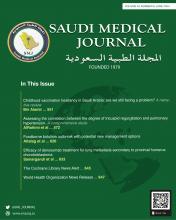To the Editor
There is a worldwide growing demand for healthcare services with rapidly rising cost. Research and audit of clinical work should help to improve cost effectiveness without compromising quality of care for patients. Almasoud et al1 have clearly shown that inappropriate laboratory tests in outpatients in a tertiary care centre amounts to 2,364,410 Saudi Riyals ($ 630,453.00) of wasted but much needed money.
The study can be looked at as part of an audit of the problem of inappropriate tests.2 They have completed the first 5 steps of the process (Figure 1); identified the problem, defined the standards, collected the data, analysed the data, and compared the findings to the defined standards. The next step is to plan and implement change of practice. They found that there was high rates of inappropriate test repetitions of commonly requested tests in family medicine practice at a tertiary hospital, which resulted in vast resource wastage.
- The audit cycle.
Their strategies to implement change includes: increasing physicians’ awareness of the appropriate guidelines for testing intervals and the integration of an electronic system that can alert physicians to repeat orders, and possibly prevent them from re-ordering tests within a specific time period. They need to implement their recommendations with meetings with the requesting physicians. This action must have the support of senior clinical management, who are in charge of clinical governance.
Clinical audit is one of the pillars of clinical governance. Once change has been implemented the audit process needs to be repeated to make sure change has happened (Figure 1).
We believe every medical institution must have a department in charge of overseeing clinical audit and quality improvement projects in every unit and department. Audit and quality improvement projects can only lead to better patients care and improvement in cost effectiveness.3,4
Reply from the Author
Thank you for commenting on our article. Indeed, this research was linked to a quality improvement project. As mentioned, every hospital should have a medical quality department overseeing the performance improvement projects. Our study was part of a performance improvement project, supervised by our wider hospital quality department. The changes were implemented and we found significant improvement in our performance on remeasurement. We will continue with the audit cycles as we seek further improvements in our performance. Again, we would like to thank you for your insightful comments.
- Copyright: © Saudi Medical Journal
This is an Open Access journal and articles published are distributed under the terms of the Creative Commons Attribution-NonCommercial License (CC BY-NC). Readers may copy, distribute, and display the work for non-commercial purposes with the proper citation of the original work.







